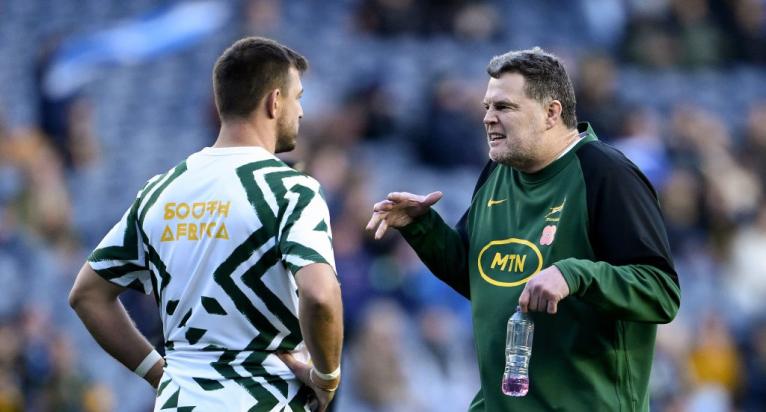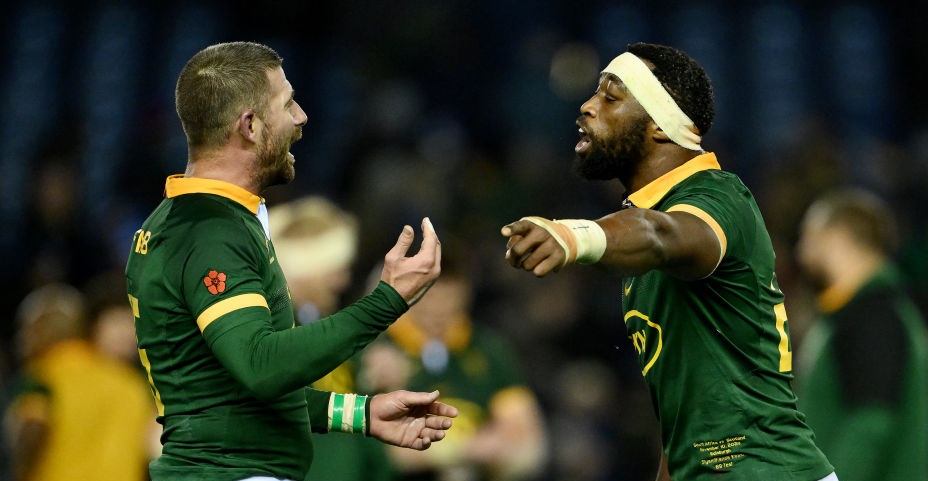The odd post-match demeanor of Rassie Erasmus and his Springboks

If you missed it, you might assume that the Springboks monstered their Scottish counterparts with another brutal display of Bomb Squad powered brutality. And to a degree, you’d be right.
They scored four tries and shut out Scotland on their own patch, restricting their hosts to nothing more than the five penalties they nudged over off Finn Russell’s boot. The South African scrum was an almost unstoppable force, especially late in the piece when it procured four successive penalties and dragged Jasper Wiese over for the fourth try at the death. Their defence was impenetrable, even in the face of some meaty carries from Scotland’s outstanding midfield and Tom Jordan cutting holes from full-back.
And yet Rassie Erasmus and his captain beside him both cut dejected figures in the post-match press conference. The Springboks coach and Eben Etzebeth were almost apologetic despite the chasm on the scoreboard. Erasmus said that there were aspects of his team’s performance that made him “nervous”, and that he was “not very proud” after what on paper looked like a comfortable win.
Double-world champions hold themselves to a higher standard than most, but let’s take Erasmus at his word and unpack what exactly went wrong and where things might improve.
Of course, the number of changes played a role. Eleven personnel switches could fill a cricket team and perhaps this is why a few key areas across the park felt disjointed, erratic and a little aimless at times.
The breakdown in particular needs work. Tony Brown has injected greater fluency in attack when the ball fizzes down the backline. Makazole Mapimpi’s two tries were both procured through audacious and accurate cross-kicks. These were plays that once felt like rare moments in Springboks rugby. Now they’re routine.
But Brown’s ethos, the same one he honed with Japan, has come at a price. Ball carriers are no longer supported by pods of teammates ready to act as cleaners. Now they move in a 1-2-2-2-1 formation which means that just about everyone on the park is expected to add their heft to the deck. We saw this with Lukhanyo Am regularly clearing rucks after Andre Esterhuizen carried into contact, once even stealing an important momentum-shifting penalty. But this can, as it did on more than a few occasions against Scotland, leave ball carriers isolated.
This is exacerbated by the desire to keep loose forwards prowling in the trams. Siya Kolisi and Pieter-Steph du Toit have occupied wider channels more frequently this year than they have throughout the rest of their careers combined. But without these scrappers supporting off the shoulder in the close exchanges, those who do carry often only have one man by their side to fend off jackals. If the gainline is not stomped over, and there is even a momentary delay from the cleaner, the opportunity for a steal is presented to the opposition.
“We’re trying really hard over the last couple of weeks to get out of the breakdown,” Erasmus explained. “Because we tend to give a lot of roll-away penalties. It’s almost 18 in the Rugby Championship. So we train really hard to get out of the channel very quickly so our 9 has access to the ball and the cleaners have access to the ball.”

This is the space that New Zealand exploited in the Rugby Championship and Scotland occupied it as well. As a result, Jaden Hendrikse had a poor game at the base of the ruck, regularly spilling the ball. It made him look ordinary. And though the scrum-half must shoulder some of the blame, he was not helped by what was taking place in front of him.
This doesn’t necessarily mean that there is a major problem that is beyond fixing. The selected loose trio of Marco van Staden, Elrigh Louw and Kwagga Smith won’t likely start together again. In Test rugby, hesitation – even for a fraction of a second – can be decisive.
“The breakdown was really scrappy,” Kwagga Smith admitted afterwards. “It was a big battle. We talked about it at half-time and it went better in the second half. We were isolated because we were late on our reactions towards the breakdown. I think that is something we spoke about, being together, getting together and into shape because that shape helps you create a clean ball. Our reactions were late.
“We were just a bit asleep. A bit too late. We got better into structure and started getting quick ball. We couldn’t get quick ball [in the first half] and that helped the Scottish defence.”

Erasmus was full of praise for his team’s effort. As is expected, the Springboks defended like Trojans when wave after wave of Scottish attack mounted at the gates in the second half. And even though it felt as if Erasmus had fired his shot too early when he emptied the bench on 46 minutes, South Africa’s impressive siege engine finally took a hold of the contest.
Were the Springboks lucky, to a degree? Gregor Townsend after the match wasn’t so direct but he suggested that this was one that got away from Scotland. South Africa were there for the taking largely because they struggled to get a toehold in the dark corners where Test matches are usually won.
“At the end of the day it was a good performance because we beat them by that margin,” Etzebeth pointed out, even though he delivered this line with slouched shoulders and a slightly demure tone. “There are some aspects of the game we are not happy with and will work on. The coaches will point that out and there’ll be some harsh words, but also good words. Sometimes you need that in a professional team environment.”
On to England now who will be smarting after back-to-back defeats but who will also be equipped with a clear strategy on how to beat these Boks.


































